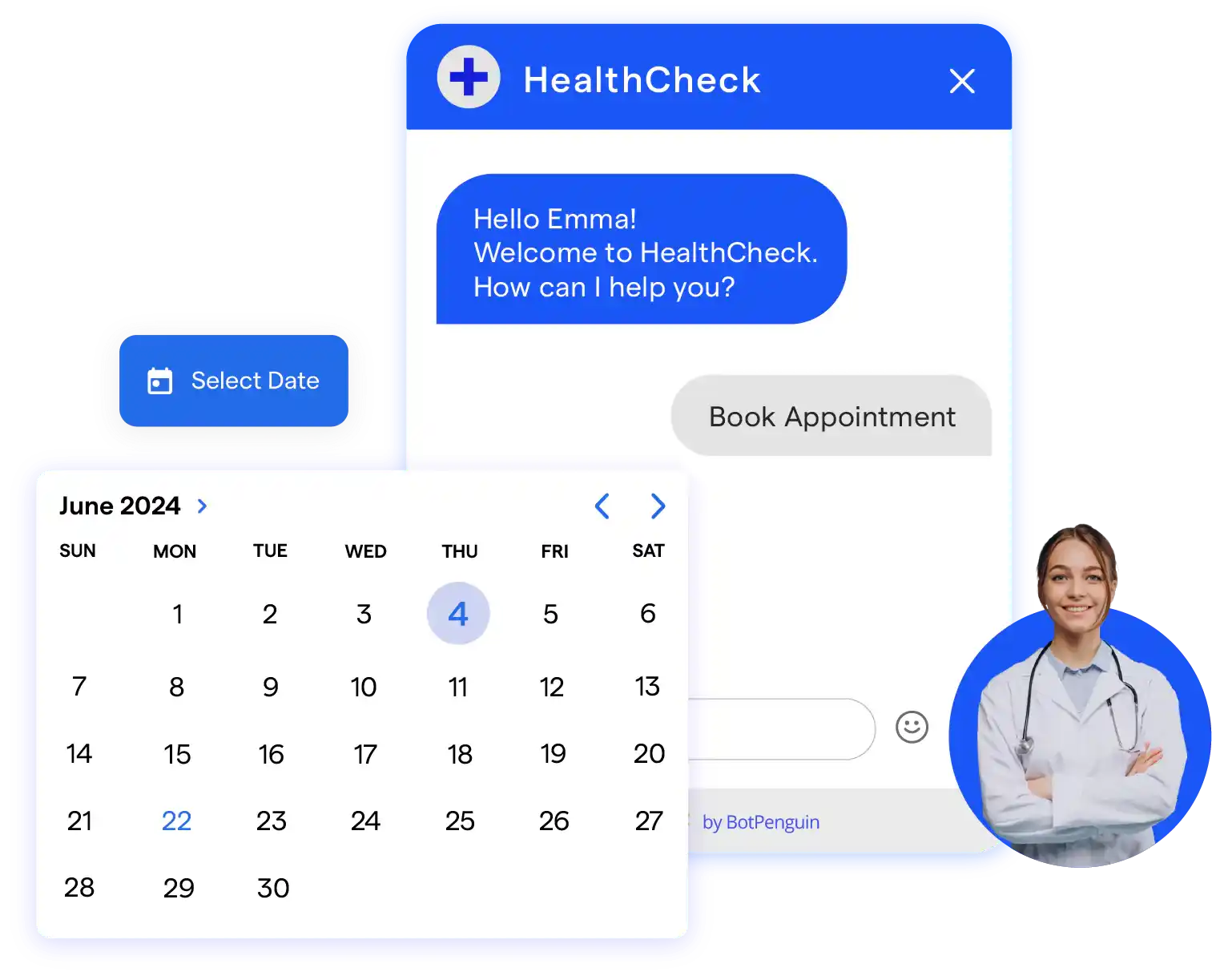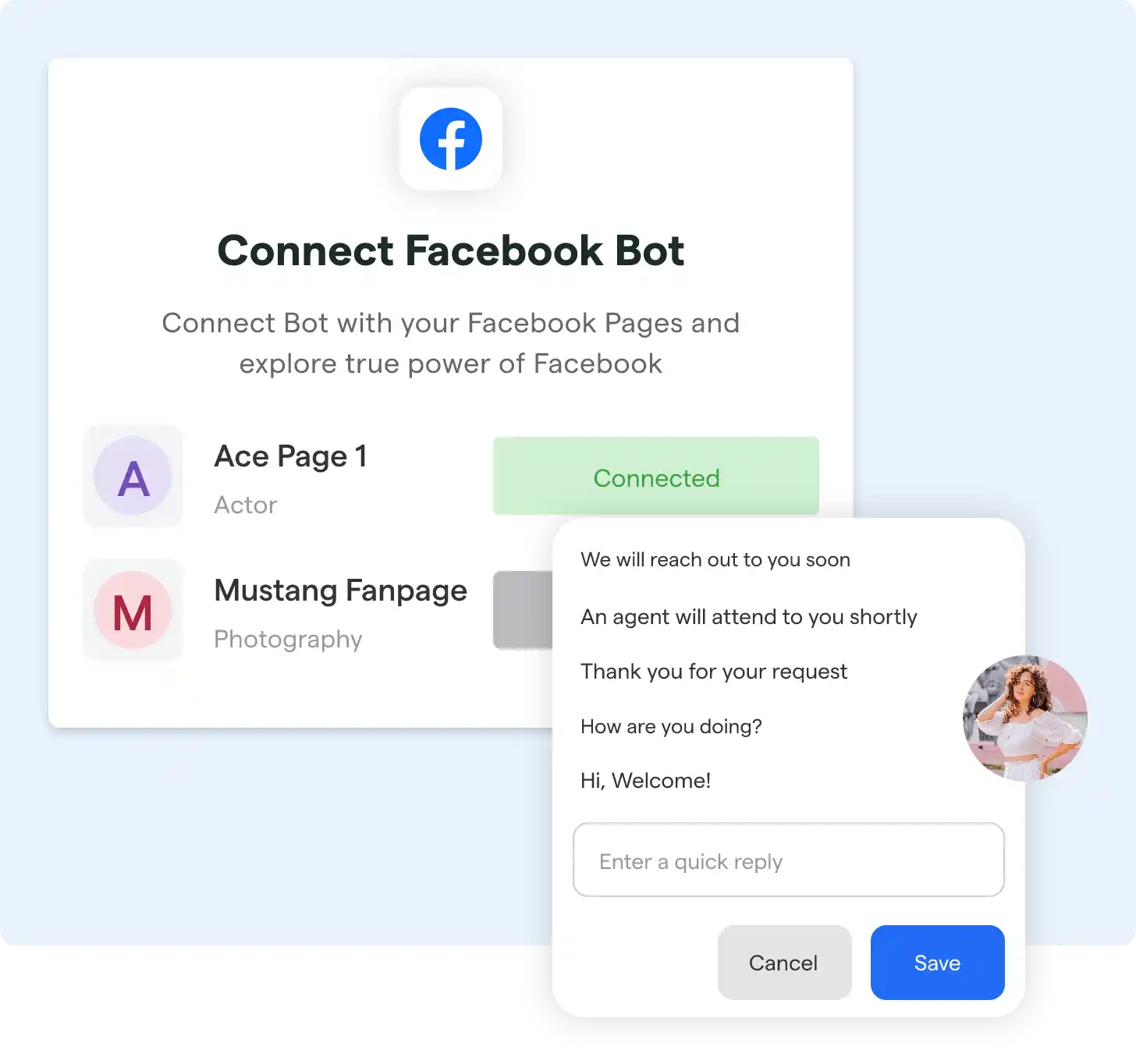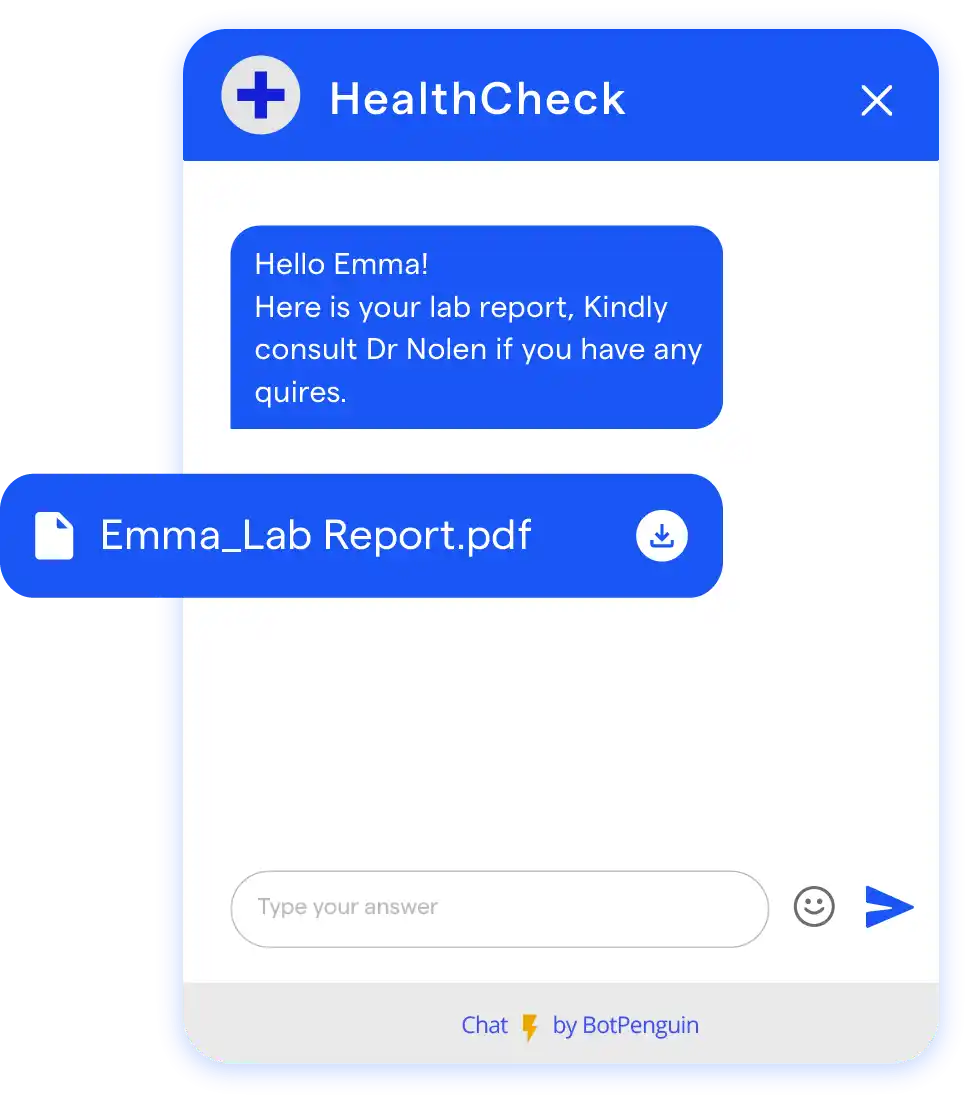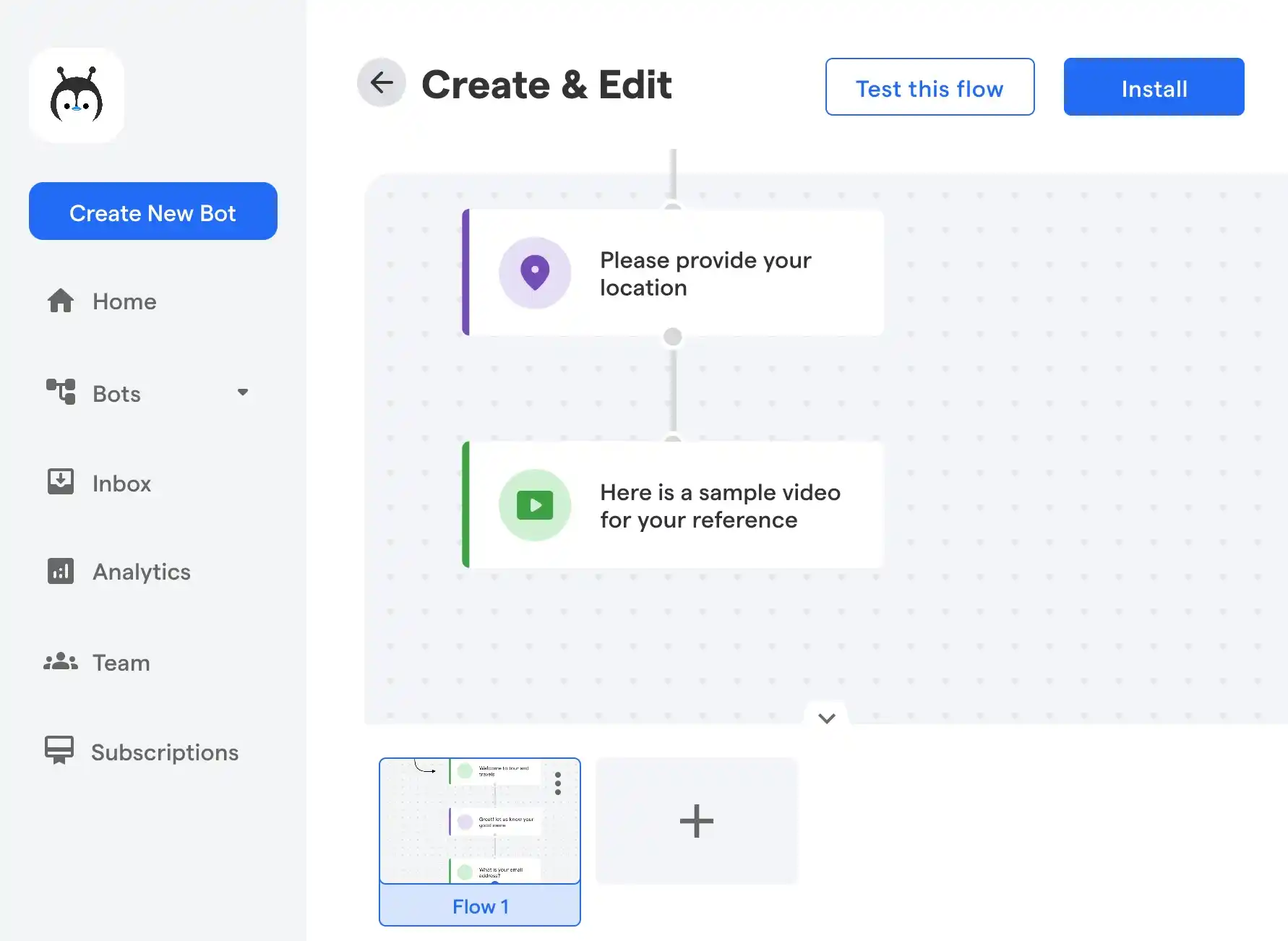Introduction
Facebook and chatbots are like the bustling waiting room and nurses in healthcare terms.
You may be familiar with chatbots and Facebook separately, but what is Facebook chatbots?
Facebook Chatbot is an AI-powered tool, integrated into Facebook Messenger, for communication and service delivery. According to Statistica, there are approximately 300,000 chatbots operating on Facebook.
As you have already noticed, chatbots are changing many different industries, and healthcare is no exception.
The way patients and medical professionals connect with one another is being influenced by these digital companions. As Facebook chatbot can offer valuable information regarding medical conditions, schedule appointments, or offer health tips and advice.
But the question remains: Is Facebook Chatbot worth it for healthcare practitioners?
For healthcare professionals, including doctors, nurses, medical practitioners, and administrators, leveraging Facebook Chatbots presents a tantalizing prospect.
So continue reading to know more about Facebook chatbot and healthcare.
Understanding Chatbots in Healthcare

The use of chatbots in the healthcare sector has grown dramatically, It has revolutionized communication between patients and healthcare professionals. So here is everything about chatbots:
What is a Chatbot?
Artificial intelligence (AI) is used by chatbots, or virtual assistants, to communicate with people via text or speech. They replicate human communication, offer automatic replies to questions, and may be programmed to carry out numerous activities.
Chatbots in the healthcare industry are created to help people with medical questions, offer information, and make appointments.
Current Use of Chatbots in Healthcare
In recent years, the use of chatbots in the healthcare industry has accelerated. So let’s see the current uses of chatbots in healthcare:
- Appointment Scheduling: Chatbots streamline the process by allowing patients to book appointments, reschedule, or cancel them efficiently.
- Symptom Assessment: They assist users in assessing their symptoms and providing initial medical advice or directing them to appropriate resources.
- Medication Reminders: Chatbots send reminders for medication intake, ensuring patients adhere to their treatment plans.
- Health Education: They deliver relevant health information, tips, and preventive care advice, promoting better health literacy among users.
- 24/7 Support: Chatbots, like BotPenguin, offer round-the-clock assistance, addressing queries, and providing support regardless of time zones or availability of healthcare personnel.
What is Facebook Chatbot?
A Facebook Chatbot is an automated messaging system designed to interact with users on the social media platform. It uses artificial intelligence to respond to queries, provide information, and assist with various tasks. It ranges from customer support to e-commerce transactions, enhancing user engagement and streamlining communication processes.
Is Facebook Chabot worth it for Healthcare Practitioners?
It is important for healthcare practitioners to carefully evaluate a chatbot's utility before determining whether to use it in their practice or not. Let's check the worthiness of Facebook chatbot in terms of pros and cons.
Advantages of Using Facebook Chatbot

The benefits of using Facebook Chatbots in the healthcare industry are countless, like:
Improved Patient Engagement and Accessibility
A Facebook chatbot provides a simple and quick way for patients to communicate with medical professionals. Patients can get lightning-fast answers to their questions and concerns by having real-time interactions, which increases patient engagement and satisfaction.
Because of this accessibility, patients are always able to get information or help, which improves their entire healthcare experience.
Automated Appointment Scheduling and Reminders
Healthcare professionals may find it time-consuming to schedule appointments. By allowing patients to schedule appointments directly through the chatbot interface, Facebook chatbots can speed up this procedure.
Additionally, chatbots can give patients automatic reminders, which lowers the possibility of missed appointments and increases overall office productivity.
Quick Response and 24/7 Availability
Facebook chatbots, like BotPenguin, are accessible 24/7, as opposed to human employees who have schedule restrictions. Even after hours, patients may still get immediate responses to their questions.
This round-the-clock accessibility improves the patient experience and guarantees that immediate problems are immediately attended to.
Cost-Effective Compared to Human Customer Support
The expenses related to providing human customer care can be greatly decreased by implementing Facebook chatbots. Without the need for extra employees, chatbots may manage a large number of requests at once.
With this affordable option, healthcare organizations may still offer effective and personalized help while assigning resources to other important areas.
And beginning with Facebook chatbots isn't that tough! Meet BotPenguin, the home of chatbot solutions.
With all the heavy work of chatbot development already done for you, BotPenguin allows users to integrate some of the prominent language models like GPT 4, Google PaLM, and Anthropic Claude to create AI-powered Facebook chatbots that can do things like customer support automation, sending order updates, running abandoned cart recovery campaigns, and more.
- Facebook Automation
- Marketing Automation
- WhatsApp Automation
- Customer Support
- Lead Generation
- Appointment Booking
Limitations and Challenges of Facebook Chatbot
Facebook Chatbots provide many benefits for the healthcare industry, but they also have certain restrictions and difficulties, like:
Risk of Misdiagnosis or Inaccurate Information
The possibility of a wrong diagnosis or the distribution of false information is one of the main issues with employing Facebook chatbots in healthcare. Chatbots depend on already programmed algorithms and replies, which might not always be able to fully understand the complex nature of unique medical problems.
Patients may suffer from complications as a result of a misdiagnosis or inaccurate information.
Privacy and Security Concerns
Privacy of Patients is not a joke and must be prioritized. Healthcare professionals understand this requirement and are required to follow rigorous data protection laws. But concerns regarding the security and privacy of patient information may arise while utilizing Facebook chatbots.
Before putting a chatbot into use, it is crucial to make sure that sufficient security measures are in place to safeguard patient data from unauthorized access or breaches.
Technical Challenges and Potential Issues with Integration
Technical difficulties might occur while integrating a Facebook chatbot with already installed programs and databases. During the integration process, compatibility concerns, data synchronization issues, and the requirement for ongoing upgrades may occur.
Before installing a chatbot, healthcare professionals should carefully assess the technological needs and potential difficulties.
Maintaining a Personal Touch in Patient Interactions
While chatbots provide speed and convenience, there is a chance that the human element of conversations may be lost. Some patients might favor the compassion and comprehension that a human healthcare professional can offer. To make sure patients feel heard and supported, it's important to strike a balance between automated replies and keeping a human touch.
So Is Facebook Chabot worthy for Healthcare Practitioners?

For healthcare practitioners, Facebook Chatbots offer significant value by improving patient engagement, streamlining administrative tasks, and providing accessible support. They enhance appointment scheduling, symptom assessment, medication adherence, and health education, ultimately leading to better patient outcomes.
Additionally, Chatbots can handle routine inquiries, freeing up staff time for more complex tasks. However, ensuring data privacy and maintaining regulatory compliance are critical considerations.
Despite these challenges, the efficiency gains and improved patient satisfaction make Facebook Chatbots a worthwhile investment for healthcare practitioners. Especially, for those who seek to enhance their service delivery and adapt to evolving patient communication preferences.
Implementing and Optimizing a Facebook Chatbot
Implementing a Facebook chatbot has grown in popularity as more healthcare organizations use technology to improve patient care and engagement. So, let’s implement and optimize Facebook chatbot.
Factors to Consider
Several factors should be taken into account when determining if a Facebook Chatbot is suitable for use in the healthcare industry:
Size and Type of Healthcare Practice
The size and nature of the medical practice are key factors when deciding if a Facebook Chatbot is appropriate. In comparison to bigger hospitals or clinics, smaller practices could have distinct needs and resources. Knowing the practice's unique demands and limitations will make it easier to decide whether a chatbot is a practical solution.
Suggested Reading:
Why BotPenguin is the best Facebook Chatbot platform?
Target Audience and Patient Demographics
To determine the usefulness of a chatbot, it is essential to understand the target audience and patient demographics. There may be differences in the preferences and uptake of technology among various patient populations.
To create a chatbot that can successfully engage and serve the target audience, it is important to have a deep grasp of the requirements and preferences of the patients.
Available Resources and Budget
A Facebook Chatbot's implementation involves both time and money. It is crucial to evaluate the healthcare practice's budget and resource availability before deciding if the implementation is practical. Assessing the chatbot's ROI and cost-effectiveness in enhancing patient care and happiness is also essential.
Legal and Regulatory Requirements
Laws regarding patient privacy and data protection must be followed by healthcare practices. Before putting a chatbot into use, it is crucial to confirm that it complies with these specifications and that the required security precautions are in place to safeguard patient information
Planning and Designing the Chatbot

Thorough planning and designing are the first steps in putting a chatbot into use. Here are some crucial actions to think about:
Assessing Patient Needs and Goals
To create a chatbot that would properly handle patients' issues, it is necessary to comprehend their wants and desired goals. Surveys, patient interviews, and feedback analysis may all be used to provide important information about the areas where chatbots might be most helpful.
Defining Chatbot Functions and Features
Healthcare practices must define specific features and capabilities of the chatbot based on the patient demands and objectives that have been determined. Does it provide a variety of services, such as symptom triage, appointment booking, and FAQs? It will be easier to direct the chatbot's development and make sure it achieves the necessary goals if its abilities are defined.
Designing Conversation Flows
To provide an effortless user experience, it is essential to design successful conversation flows. Creating logical and natural interactions with chatbots requires mapping out probable user inputs and answers. Observing the discussion channels may be done by using decision trees or flowcharts.
Testing and Iterating
Iterating and testing often need to be done to improve the chatbot's performance. Finding areas that require improvement may be accomplished through usability testing and user input. The chatbot is continually improved through iterative development to better serve patient demands.
Ensuring Compliance and Security
Enforcement of obedience and data protection is essential when using a Facebook chatbot in the medical field. Here are some important points to remember:
HIPAA Compliance
Health Insurance Portability and Accountability Act (HIPAA) fulfillment is a requirement for healthcare organizations' chatbots. This involves protecting patient data, preserving their privacy, and putting in place suitable access restrictions to maintain its confidentiality.
Secure User Authentication
Secure user authentication techniques, including two-factor authentication, can be implemented to stop unauthorized access to patient data. To protect sensitive information, healthcare practices should also encrypt data transfer.
Regular Security Audits
It's critical to conduct regular security audits and vulnerability assessments to find and fix any possible security holes. Examining access restrictions, encryption standards, and keeping track of data breaches or unauthorized access attempts are all part of this.
Measuring Success and Continuous Improvement
Healthcare practices may continually enhance their performance by evaluating the success rate of a Facebook Chatbot application. Here are several methods to evaluate achievement and encourage continued optimization:
Key Performance Indicators (KPIs)
Establish defined KPIs that are in line with the goals of the chatbot. These could include figures for customer satisfaction, response speed, and patient participation. The success of the chatbot in achieving the desired results may be measured by healthcare practices by routinely monitoring certain parameters.
User Feedback and Surveys
Use surveys or feedback forms to get user input. This offers insightful information on user experiences and points out areas that might require improvement. The chatbot's performance may be improved by actively listening to user comments.
Continuous Iteration and Updates
Create a gradual plan for continually improving based on user input and KPI analysis. This may include improving conversation flows, boosting the chatbot's functionality, and adding new features that address patient requirements.
Conclusion
In conclusion, Facebook Chatbots in healthcare is a new technology that presents a bright future.
Facebook chatbots are being used by healthcare organizations to boost patient involvement, streamline administrative procedures. These AI-powered virtual assistants speed up appointment scheduling, give quick answers to frequent questions, and may even help monitor patients' health. These features increase productivity and patient happiness.
Healthcare professionals must comprehend the limitations as well. The challenges of involving chatbots in the healthcare ecosystem, from possible data privacy problems to the necessity for cautious design and ongoing monitoring.
Even so, careful preparation, commitment to rules, and ongoing improvement are necessary for successful implementation. The process of installing and improving a Facebook Chatbot is really important for development.
However, there is no one-size-fits-all approach to using chatbots in healthcare. Healthcare professionals must set out on this journey after carefully evaluating their requirements, the resources at their disposal, and the particular make-up of their patient group.
Healthcare workers may fully appreciate the promise of Facebook Chatbots and provide their patients with improved treatment by carefully taking into account issues like planning, upholding compliance, and a dedication to continuous development.
So, when used carefully and continually improved, Facebook chatbots offer healthcare professionals an appealing alternative.
Suggested Reading:
How to Get the Best Out of Your Facebook Chatbots?
Frequently Asked Questions (FAQs)
What are the potential benefits of using Facebook Chatbots in healthcare practice?
Using Chatbots in healthcare can improve patient engagement, automate appointment scheduling, provide timely health information, and enhance administrative efficiency.
How can a Chatbot assist with patient inquiries and concerns in a healthcare setting?
Chatbots can handle common patient queries, provide health advice, and offer immediate responses, improving patient satisfaction.
Are Facebook Chatbots secure and compliant with healthcare regulations?
Ensuring patient data security and compliance with HIPAA regulations is crucial when using Chatbots in healthcare.
Can Chatbots be integrated with electronic health records (EHR) systems?
Chatbots can integrate with EHR systems, making it easier to access and update patient information.
How can Chatbots streamline appointment scheduling and reminders for healthcare practitioners?
Chatbots can automate appointment bookings, send reminders, and reduce no-shows, enhancing the overall patient experience.

